Meme – an image or a short video with a brief caption- is a highly popular form of digital content today. Though internet memes have been consumed and shared almost since the inception of social media, the pandemic has been a big factor in fueling their popularity. Locked at home, facing once in a lifetime crisis, consumers found a stress-buster and even an emotional catharsis in memes.
So much so that global as well as Indian researchers took note of this phenomenon and its impact on the consumer psyche. Papers researching the explosion of memes and their mental impact during COVID-19 have been published in peer-reviewed science research journals like Nature.
Today memes have become an integral part of internet culture and are seen everywhere. Entities across the board- brands, political parties, government authorities and individual consumers- are participating in the frenzy.
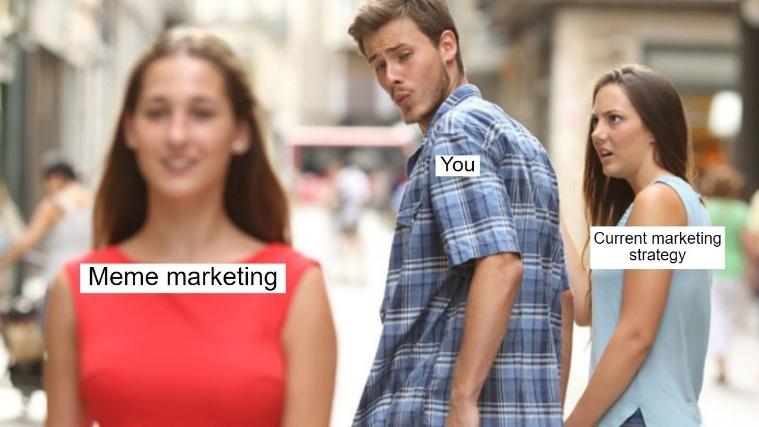
What are the benefits of meme marketing?
While memes have become a highly popular and engaging content format, with many brands experimenting with meme marketing, it’s worth asking if this content form delivers some real benefits or if it is just a passing fad. As it turns out, meme marketing when done right, can have many advantages.
Memes are short, crisp and mostly funny so as a content format, they esp. suit the sensibilities of young consumers and are highly shareable. If a brand can get them right, it can leverage this inherent virality. Memes thus provide a route to garner good brand recall and virality, with a relatively lower cost of promotion.
Talking of cost, even the cost of product in this age of the meme is quite low. A brand on a shoestring budget can also produce a slew of memes. Hence, memes as a marketing channel are both democratic and cost-effective.
Memes, even if they promote a brand’s POV, aren’t seen as typical ‘ads’- they are content in the true sense. Hence, they lead to a lot of organic chatter. If executed well, memes can turn brand consumers into unwitting evangelists.
Finally, sheer democracy of creation makes memes a highly relatable content format that everyone can improvise on and participate in. Memes can therefore make a brand seem more approachable and even popularize it. For example, a testimony of immense popularity of Shark Tank India was the sheer number of meme templates it inspired.
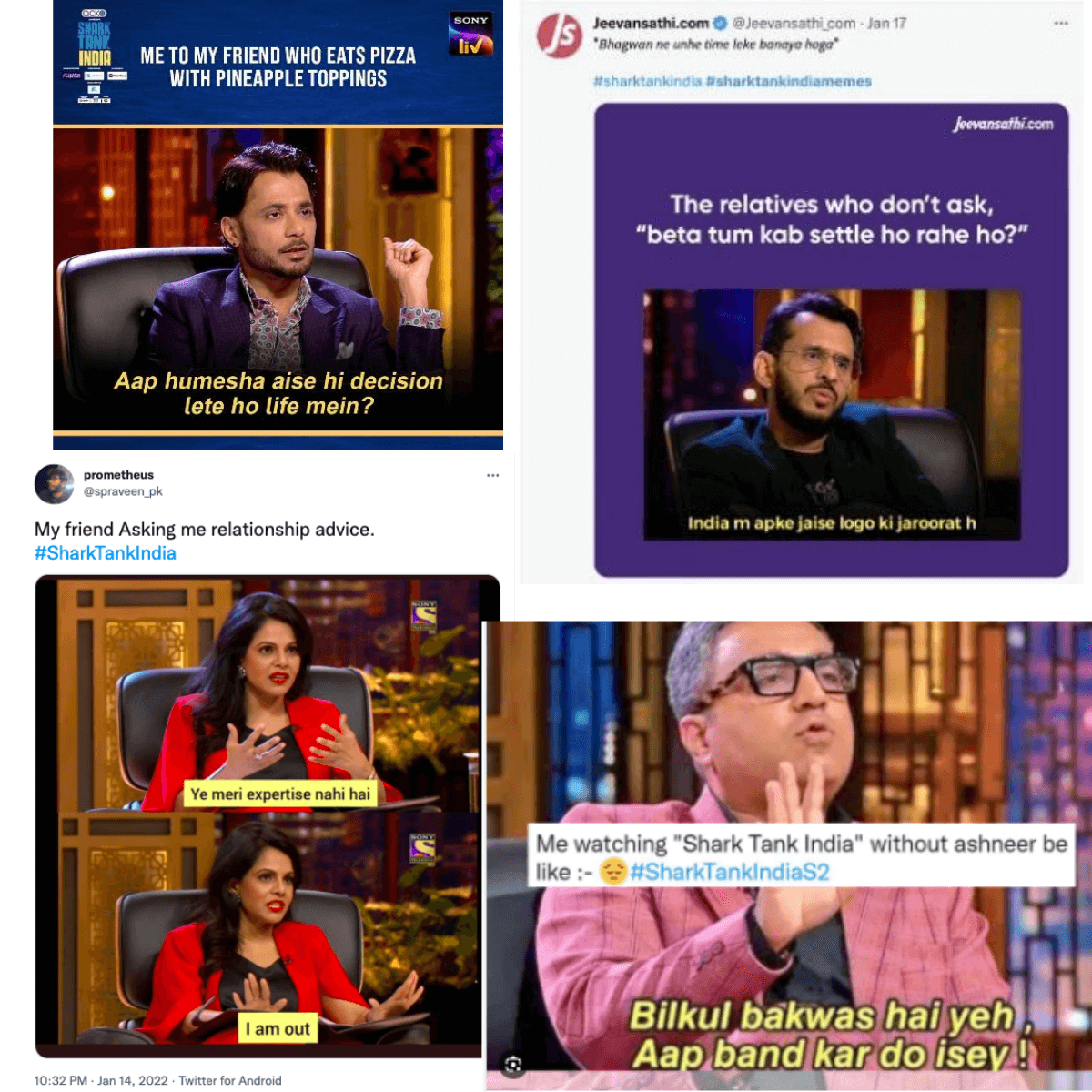
What makes for a good meme
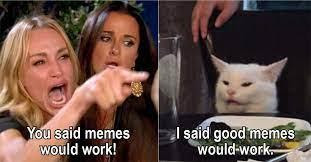
To understand what makes a good meme, it is worth exploring the origin of this word. A NYT article on the topic goes on to say:
“Professor Richard Dawkins, an evolutionary biologist, who coined the word in his 1976 best seller “The Selfish Gene” said, “We need a name for the new replicator, a noun that conveys the idea of a unit of cultural transmission, or a unit of imitation.” He wanted to use a monosyllable that sounded like “gene” and went on add, “It could alternatively be thought of as being related to ‘memory,’ or to the French word même”….
…..the popular meme creator Saint Hoax, who has three million Instagram followers, defines a meme as “a piece of media that is repurposed to deliver a cultural, social or political expression, mainly through humour. It has the ability to capture insight in a way that is in complete alignment with the zeitgeist”
This classic definition and its contemporary interpretation give many clues on what makes a good meme. It should be relatable and shareable. A good meme in essence is WISE:
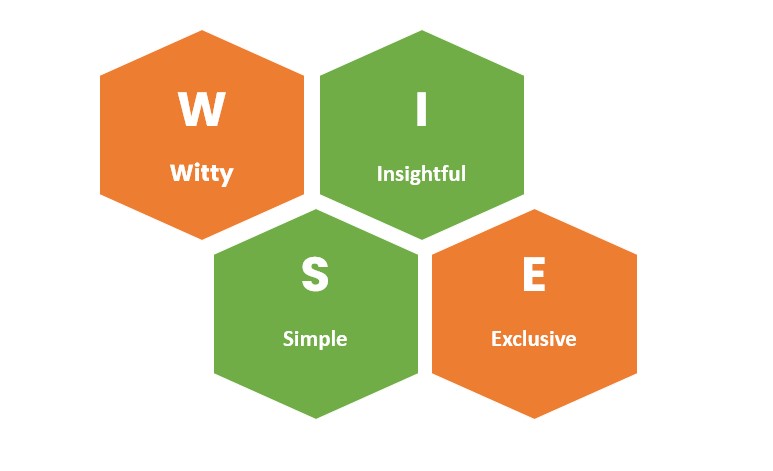
Witty
To be able to get consumer attention a meme needs to be witty- it needs to make its point in a clever way. Remember that a meme is not a brand banner or pamphlet. Hence memes that simply tend to convey a piece of information in a matter-of-fact way are quite likely to fall flat and may not deliver much benefit.
Insightful
A meme is humorous but it is often more than a mere joke. A thought-through meme is based on a real and relevant human insight that makes consumers nod in agreement while bringing a smile to their faces. Insightful memes are most likely to find shareability as consumers can relate very well to them.
Simple
If a meme isn’t understood by the intended audience in one go, it has failed to do its job. A meme should therefore be absolutely comprehensible and simple to understand. Even an insightful and witty meme will fail to impress if it uses jargons, convoluted language or esoteric symbolisms.
Exclusive
To find the best traction, a meme should have a bit of exclusivity. While it should be instantly understood by the target audience, it is great if it requires an effort to be understood by others. Such memes make target consumers feel like a part of an inner circle and increase their shareability potential.
Some best practices in meme marketing
From the above, it’s clear that while memes are fun, getting meme marketing right isn’t always easy.
Meme marketing requires the brand to have a knack for blending insights with humor. The brand should loosen up a bit- it should be ready to even take occasional potshots on itself if it conveys the point. A content that always eulogizes the brand’s official spiel in brand tone may not travel well as a meme. For instance, Zomato- one of the pioneers in meme marketing in India- has memes that at times even take a dig at their consumers; but they never fail to bring a smile:
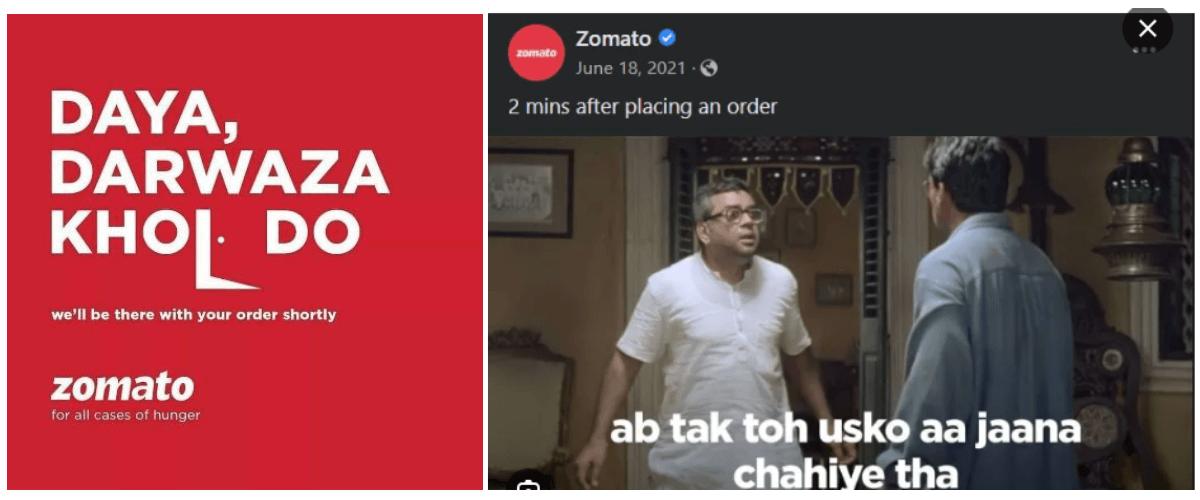
The brand even recounted its end of year order stats in 2020 as a series of memes calling the thread as ‘2020 meme rewind’:
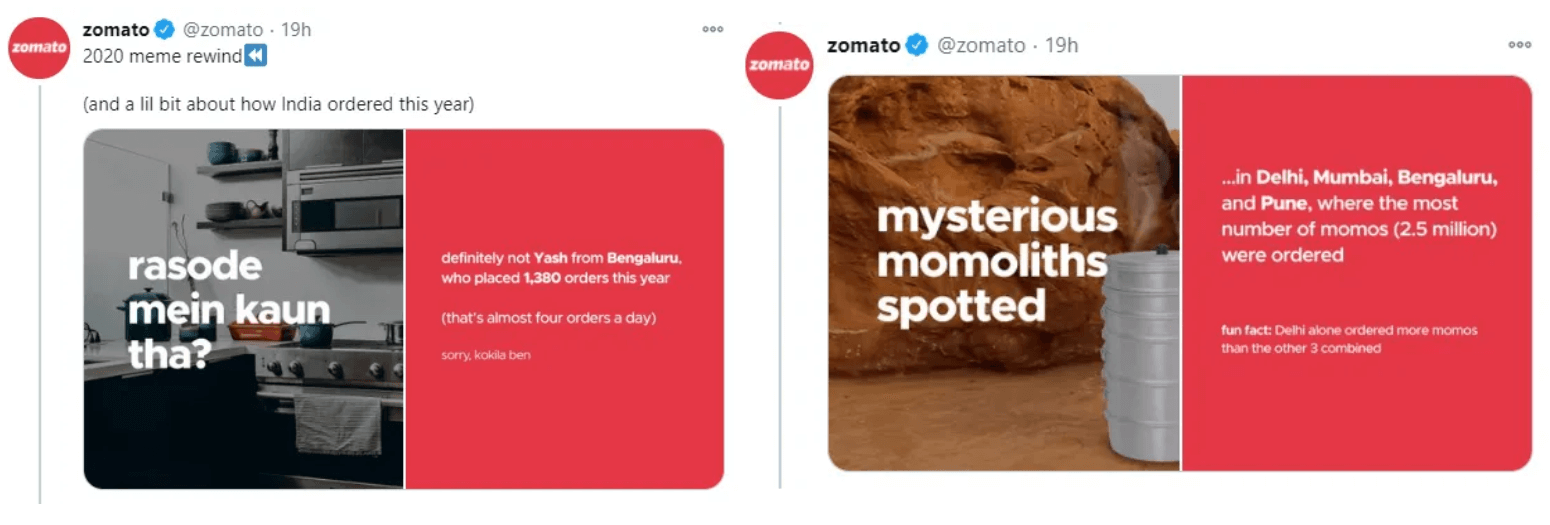
Meme marketing doesn’t require a brand to always make its own meme template. In fact, unless brand is popular custom templates could become difficult to understand. A brand can use a recycled meme template and give its own take without altering its basic meaning. This makes the meme immediately understandable while giving it the unique brand twist. When it comes to meme templates, simplicity and ease of comprehension is most important.
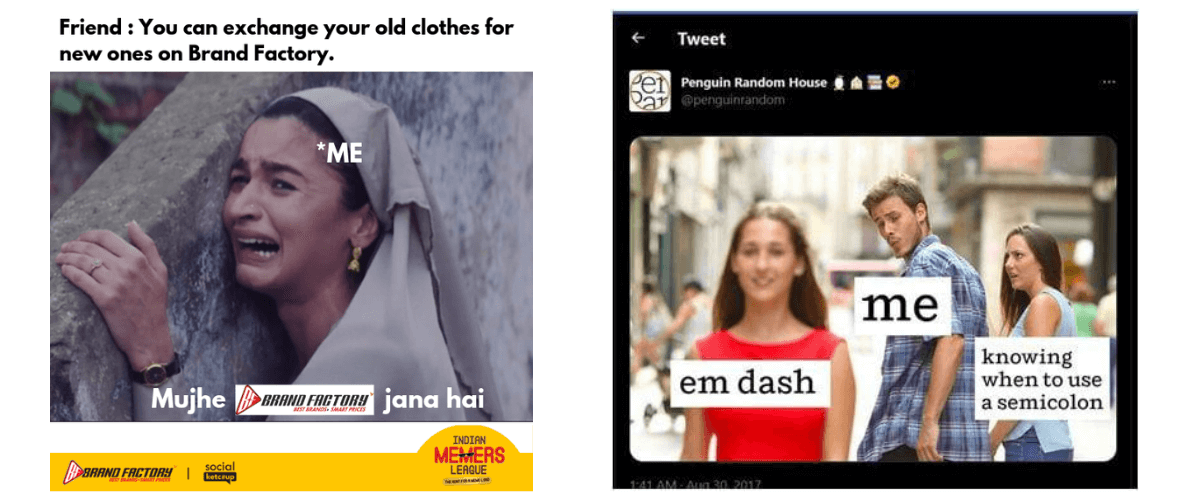
A common misnomer about meme marketing is that it works well only when brands are riding on a trend. While a thought-through meme on a trending topic will carry organic traction, a brand need not always wait for trends to create a meme. Brands that have perfected the craft use meme marketing as a strategy and not a moment marketing tool. For instance, Netflix routinely uses Memes to create awareness and intrigue about popular properties on its platforms:
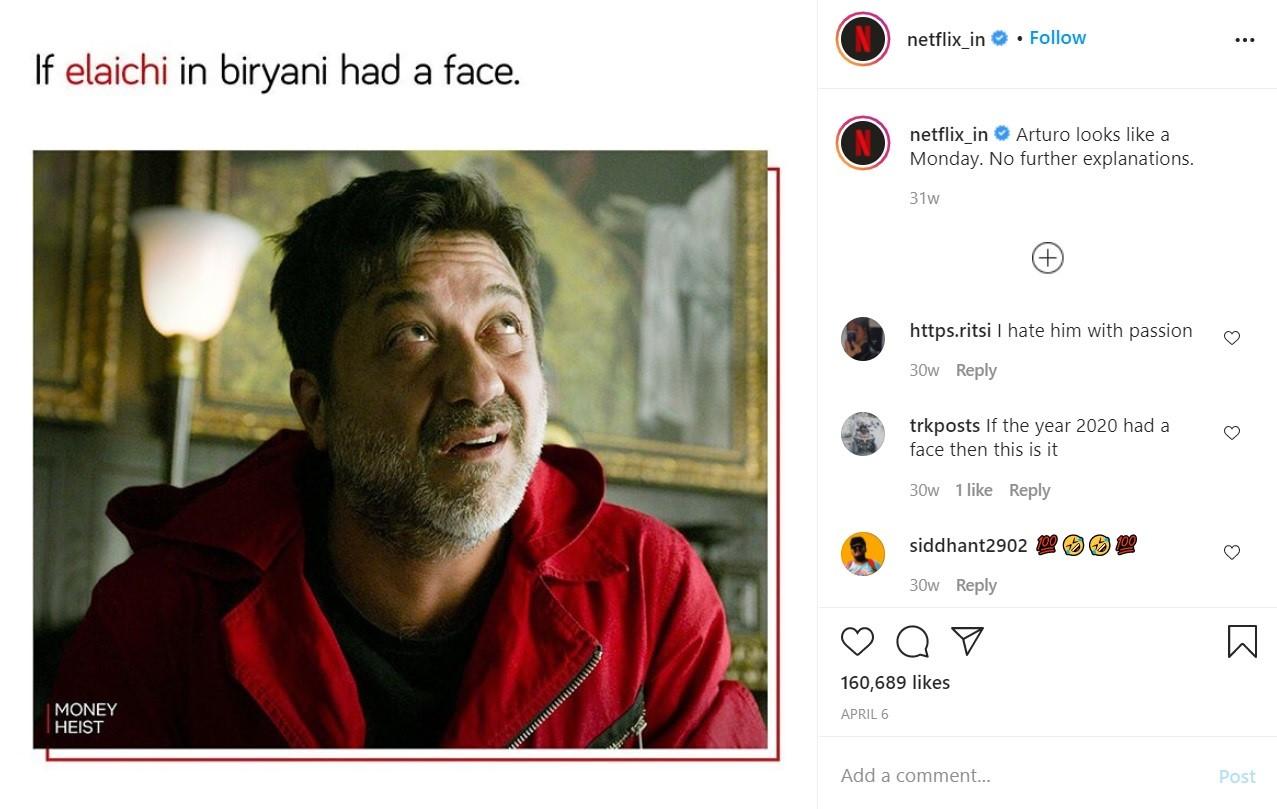
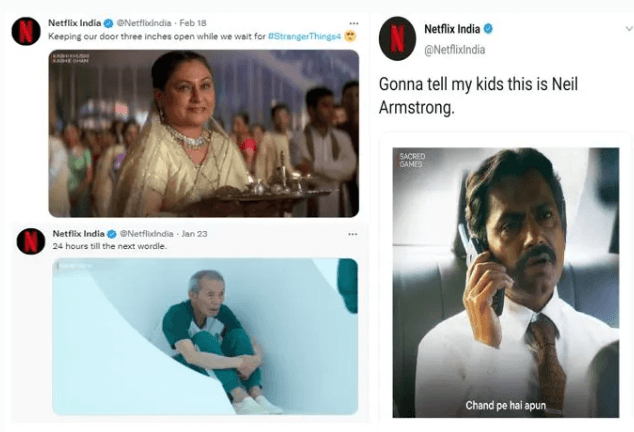
Also, unlike what’s commonly thought, memes can also be used to drive home serious messages in a light-hearted way. For instance, Bangalore and Mumbai traffic police authorities often use memes in their twitter account to create public awareness on topics like road safety and following traffic signals:
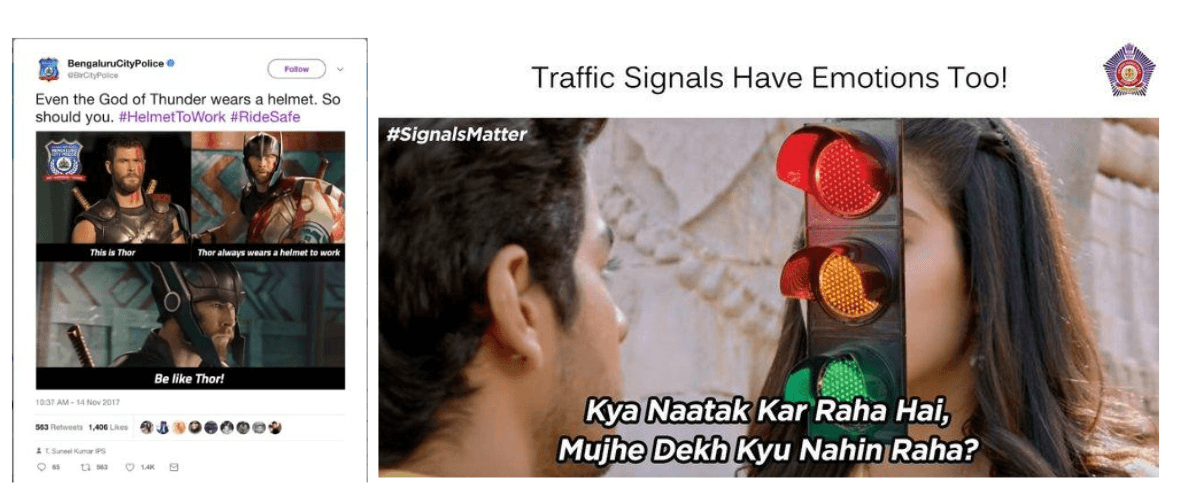
Finally, meme marketing may not always entail brand creating a meme. Given that meme is a fairly democratic piece of content that anyone can create, brands can also crowdsource them. Brands can engage consumers through interesting ‘caption this’ challenge, offering them a stimulus to create their own memes, just as Netflix did:
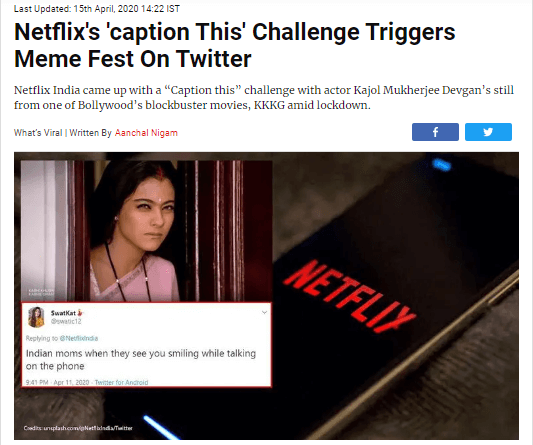
Sometimes consumer-created brand memes trigger a lot of buzz. Brands can participate in these organic conversations and amplify the engagement. Spotify leveraged this very well in case of the famous ‘Spotify – Good Day logo’ episode, briefly changing its logo on Twitter profile in response to a Twitter users observation that pointed out an uncanny resemblance between the Spotify logo and a Good Day biscuit:
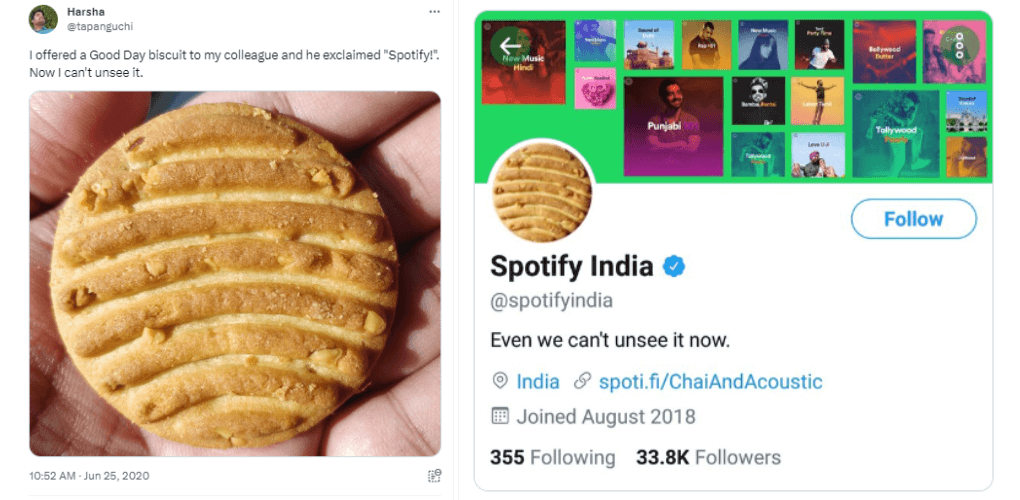
This smart and sporty move from the brand won many consumer accolades, instantly triggering a slew of positive conversations and memes:

A few watchouts
Besides its benefits, meme is also an extremely flexible content format. Memes can be in the form of pictures, GIFs or short videos. They could be either used as a standalone social media post or could be used to spice up brands’ blogs or newsletters. However, this flexibility, ease of creation and apparent democracy of format also calls for some caution.
Given that anyone can create them, there is a plethora of memes flooding consumer’s social media and WhatsApp timelines. Hence even the most potent memes tend to quickly lose their shareability potential. Memes should therefore be used judiciously to create content diversity.
Memes should have an entertainment value but at the same time, they cannot be disconnected from the brand narrative. They are a part of the brand’s overall content repertoire and consequently should sync well with the overall content theme, tonality and messaging. Rather than being known as an ‘excellent meme creator’, a brand should endeavour to be known as a creator of share-worthy, interesting and category-relevant content- memes being a part of it.
Finally, memes thrive on being punny, sarcastic and light-hearted. As we mentioned earlier, taking an occasional dig on competition, consumer, category or brand doesn’t hurt. However, memes should stick to the unsaid code of ethical marketing conduct. For instance, however meme-worthy the topic may be, targeting a minority group, hurting religious sentiments or making light of a sensitive situation is never a good idea. Similarly, while holding meme contests, brands should put riders and ensure moderation rather than turning it into a no-holds-barred meme-fest.
Another problem with the democratic nature of memes is that anyone can create a branded meme and in case the content is controversial, the brand might face a completely unintended consumer backlash, forcing it into crisis mitigation mode. For instance, a meme purportedly from erstwhile Jet Airways taking a dig at a viral video of Indigo staff manhandling a customer led to a controversy, forcing the airlines to issue a clarification.

In Conclusion
With reduced attention spans and the need for short, snappy content, meme marketing is here to stay and can be a potent tool in a brand’s marketing arsenal. However, the key to meme marketing isn’t too different from the basic tenets of good marketing. Being clued into the popular culture and knowing the consumer pulse are prerequisites for both.
Leverage the power of top marketing talent
WinnerBrands helps organizations hire top marketing talent.
Be it performance marketing experts, content specialists, creative directors, designers, video editors or brand managers, we can help you find the right marketing talent to unlock your brand’s potential.
Run by marketers for the marketers, we are already a preferred marketing talent partner for both established conglomerates and agile startups.
WinnerBrands can serve as the one-stop solution for all your marketing talent hires, offering you complete flexibility to engage this talent in your preferred engagement format-
- Full-time (on your payroll)
- Contractual (on our payroll)
- Or on a freelancing basis.
So, if you are looking to onboard the best marketing talent, vetted by industry experts, in the shortest possible time, then WinnerBrands is your go-to place.
Talk to our founders and explore smarter ways to hire marketing talent by clicking here
Cheers,
Team WinnerBrands
